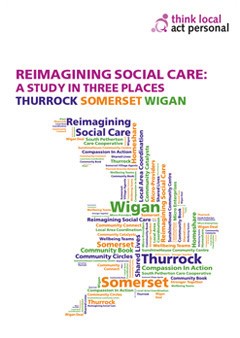Reimagining social care - a study in three places

This study looks at how some councils are seeking to transform social care by working closely with innovative providers and shifting their own approach to commissioning.
Based on three sites – in Thurrock, Somerset and Wigan, it explores what councils are doing to re-define the relationship between themselves and the communities they serve.
This report should be of interest to everyone who is committed to finding workable and authentic ways of providing care and support that is rooted in people and communities.
Executive Summary
This report is based on a study carried out in the three council areas of Thurrock, Somerset and Wigan, all of which are seeking to transform how they provide social care in the context of diminished financial resources and rising demand. Whilst each council has a different story to tell, they share a commitment to moving forward with asset-based commissioning and strengths-based approaches to practice. The report captures the ambition, experience and insights of this work in progress and is intended to inspire and inform others who wish to take a similar route.
The Care Act 2014 introduced a range of new responsibilities to local government; it re-casts the social care responsibility of councils as a duty, not simply to meet the needs of eligible residents, but to promote the well-being of the population of their administrative area. Councils are trying to implement this vision in a time of radically reduced resources.
Some councils are attempting to reimagine social care by working closely with innovative providers and shifting their own approach to commissioning and social work to make the Care Act’s aspirations a reality. These approaches are based on the principles of building and maintaining family and community connections and relationships, as well as fostering individual confidence, knowledge and resilience.
Our three sites are very different. What unites them is a positive approach from their leaders in responding to the challenges of the post-Care Act world. In all three places, their approaches focus on changing the relationship between the council and the communities they serve. This means turning outwards: focusing on, and building on, the strengths of the neighbourhoods and villages where people live and sharing power with them.
KEY MESSAGES
- the value and necessity of senior managers creating a permissive framework that creates the expectation and provides support for practitioners to work in imaginative person and community-centred ways and to extend this approach to all providers insofar as possible
- a clear sighted commitment to foster development of services and support, often small-scale, which is anchored in the community
- the importance of re-defining the relationship between local councils and their residents in terms of how care and support can best be provided
The innovative process of change described in this report is by no means complete, but all three sites will certainly be places to watch for those interested in how social care will look in the future. The report should be of interest to everyone who is committed to finding workable and authentic ways of providing care and support that is rooted in people and communities.
We anticipate that it will be of particular relevance to commissioners and those responsible for the leadership, training and development of the workforce.
